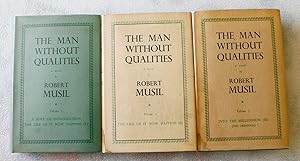


This utopian state constitutes a radical resistance to closure and final conclusion, manifest in a life of creative aliveness and presence that is represented by another of Musil’s favored utopias: the “Utopia of the Motivated Life.” As Albrecht Schöne pointed out in his brilliant essay on the use of the subjunctive in Musil’s novel, this mode of thought (like the subjunctive case that expresses it) is anathema to rigid (and declarative) systems.Īnd Robert Musil’s serious engagement with utopian thought, from these early plays and critical writings through the last decade of his life and the last notes for his life’s work, are also a measure of the central social role he assigned to art.Īnd yet, like Ulrich and Agathe in The Man Without Qualities, and Alpha and Vinzenz in Musil’s second play, their entire protest against the self-same, their resistance to normal life and its dissatisfying requirements, requires precisely that they do step out of the pre-determined lines in an imaginative act of ethical aliveness. None was more favored than his “utopia of the next step,” a mode of life and thought prefigured in The Utopians and in Vinzenz and the Mistress of Important Men, whereby an action may only be judged by what it brings in its wake, ad infinitum. We know that late drafts for The Man without Qualities are rife with a variety of utopias, which the author in extremis considered as possible endings for the unfinished (unfinishable) novel. Of the second, Vinzenz and the Mistress of Important Men (1923)-a farce that was performed to enthusiastic audiences even before its publication in book form-he reported, “ecause, for once, it just all finally got to be too stupid, I have written a play in 14 days.” Both were written in tandem with his close analysis of contemporary theater and as partial answers to the problems this analysis posed. The Utopians (1921)-which took him approximately ten years to write and which he considered one of his major works-was written, he explained, to “finally, for once, bring some spirit into the controversies surrounding the theater.” It was awarded the prestigious Kleist Prize almost immediately, but was only premiered in 1929, against Musil’s wishes, under the directorship of Jo Lhehrman-a con-man who could almost have come right out of one of Musil’s own plays. In one notebook entry, he writes that “A pathologist would be able to diagnose a great deal about our time through the theater.”Īccording to his own avowal, Musil was spurred on to the writing of his two finished plays, The Utopians and Vinzenz and the Mistress of Important Men, by his negative assessment of the contemporary offerings.

He later had plans to collect his writings on theater into a book, which he considered calling Pathology of the Theater or Theater from the Outside. The years 1921 to 1924 constituted the height of Robert Musil’s participation in the world of theater as both critic and dramatist.


 0 kommentar(er)
0 kommentar(er)
